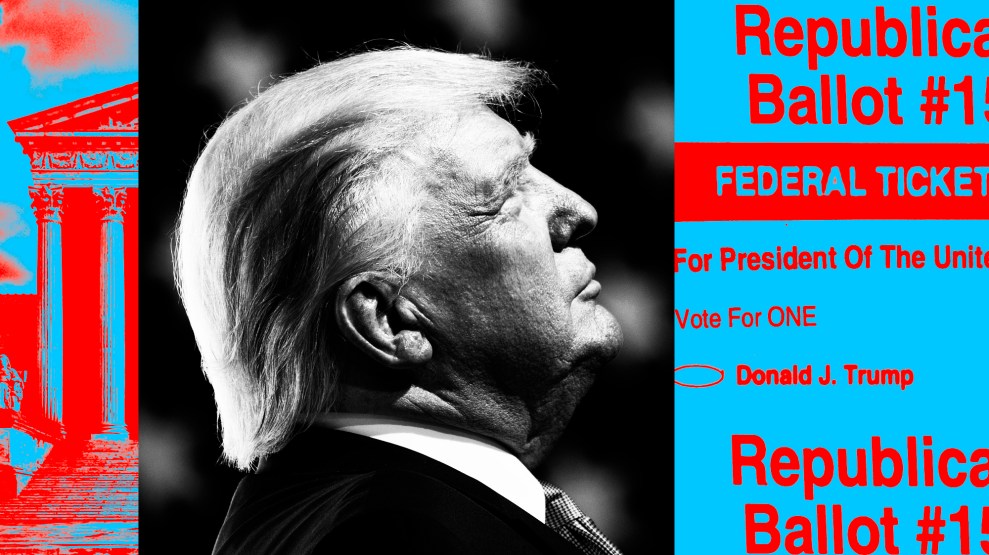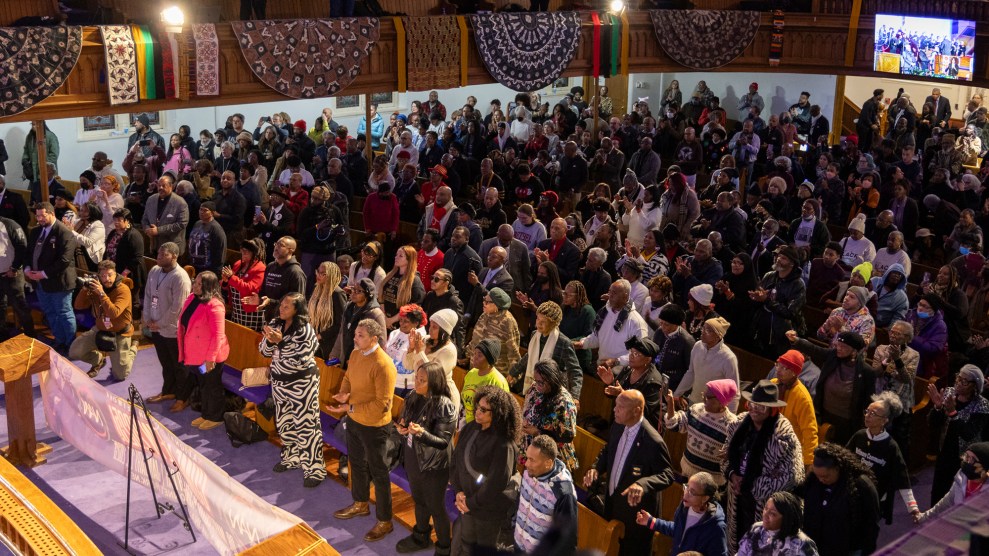
Mother Jones illustration; Brendan Smialowski/AFP/Getty; Nati Harnik/AP; Tim Mossholder/Unsplash
Donald Trump will appear on voters’ ballots in Colorado—and every other state. The Supreme Court sided with the former president on Monday, finding that the 14th Amendment’s prohibition on insurrectionists holding office, known as Section 3, does not allow states to keep Trump from participating in the election.
In an unsigned opinion, the court stated that it was Congress’ role to keep insurrectionists off federal ballots, and not an authority of the states. “States have no power under the Constitution to enforce Section 3 with respect to federal offices, especially the Presidency,” the opinion states. In a concurring opinion, the three liberal justices agreed that Trump should remain on the Colorado ballot, but did not agree that only Congress can enforce Section 3. Justice Amy Coney Barrett would likewise not have limited enforcement to Congress.
The liberal dissenters allege that the court’s Republican-appointed majority goes beyond the scope of the case and the text of the 14th Amendment. “By resolving these and other questions, the majority attempts to insulate all alleged insurrectionists from future challenges to their holding federal office,” they write.
Monday’s ballot disqualification decision comes after Trump appealed a December ruling from the Colorado Supreme Court that barred him from the state’s GOP primary ballot after they found he was prohibited from holding office under Section 3. Passed in the wake of the Civil War, the 14th Amendment states that “no person shall…hold any office, civil or military, under the United States, or under any state, who, having previously taken an oath…as an officer of the United States…shall have engaged in insurrection or rebellion against the same, or given aid or comfort to the enemies thereof.” A group of voters in Colorado challenged Trump’s eligibility, arguing that this Reconstruction-era prohibition applied to Trump’s attempt to overturn the results of the 2020 election, including the violent attack on the US Capitol. The state court’s decision would have created chaos by keeping a major party’s likely candidate off the ballot there, and, if allowed to stand, would have opened the door to other states to do the same.
The justices took the impact of a ruling against Trump seriously, and issued a decision that sidesteps the chaos that would follow his disqualification from some state ballots. “Nothing in the Constitution requires that we endure such chaos,” they wrote.
The three Democratic-appointed justices agreed that this “patchwork” situation is enough to decide the case, but dissented from the majority’s opinion that only Congress can enforce Section 3. “The majority announces that a disqualification for insurrection can occur only when Congress enacts a particular kind of legislation pursuant to Section 5 of the Fourteenth Amendment,” they wrote. “In doing so, the majority shuts the door on other potential means of federal enforcement.”
This is at least the second time the court has rescued Trump from accountability for trying to overturn the 2020 election—and, once again, the decision gives a giant boost to the former president’s 2024 campaign as Trump attempts to dodge criminal charges leveled by special counsel Jack Smith. The court aided that effort last week by agreeing to hear Trump’s improbable theory that he is immune from prosecution for official acts in the course of his presidency, likely delaying his criminal trial for election subversion until after the 2024 election. Even if the Supreme Court ultimately rules against Trump in the criminal case, it will have done him an immense political favor.

















